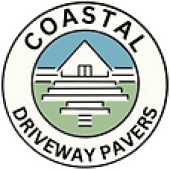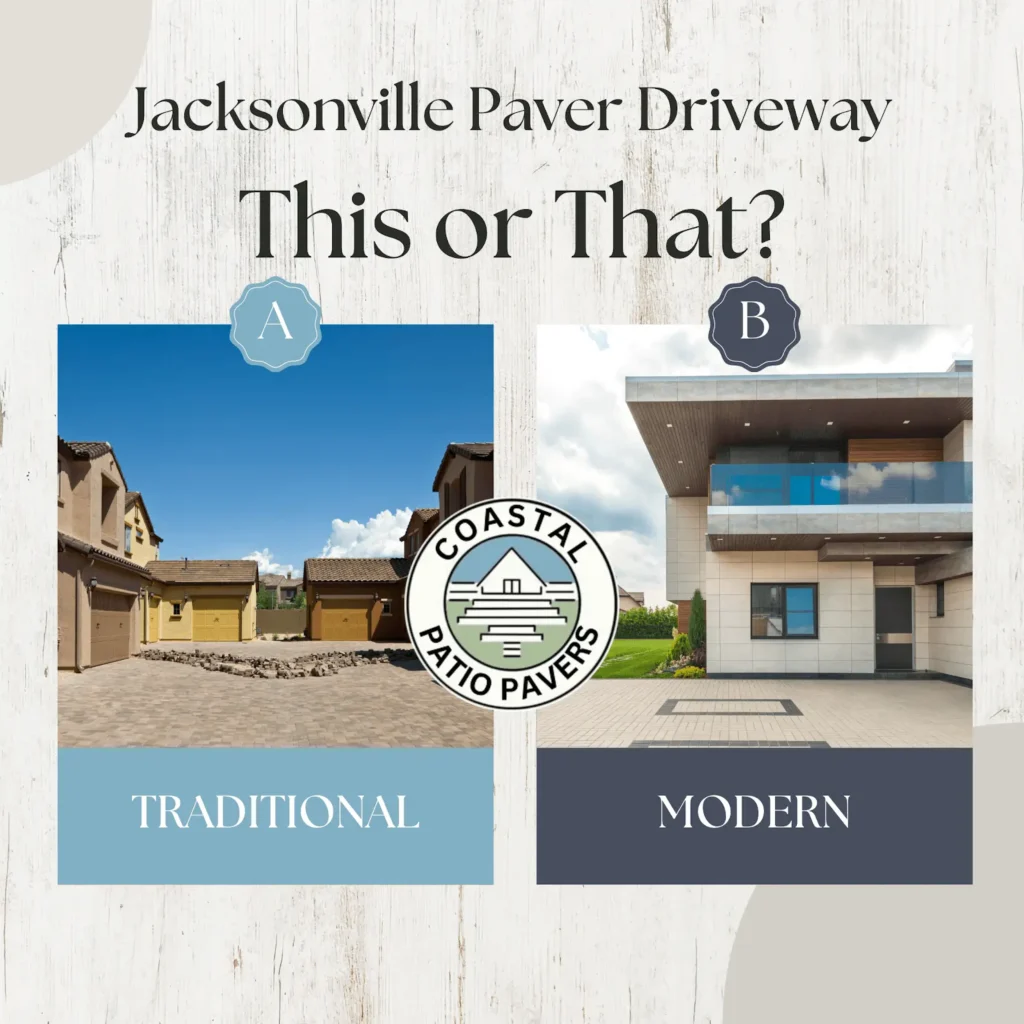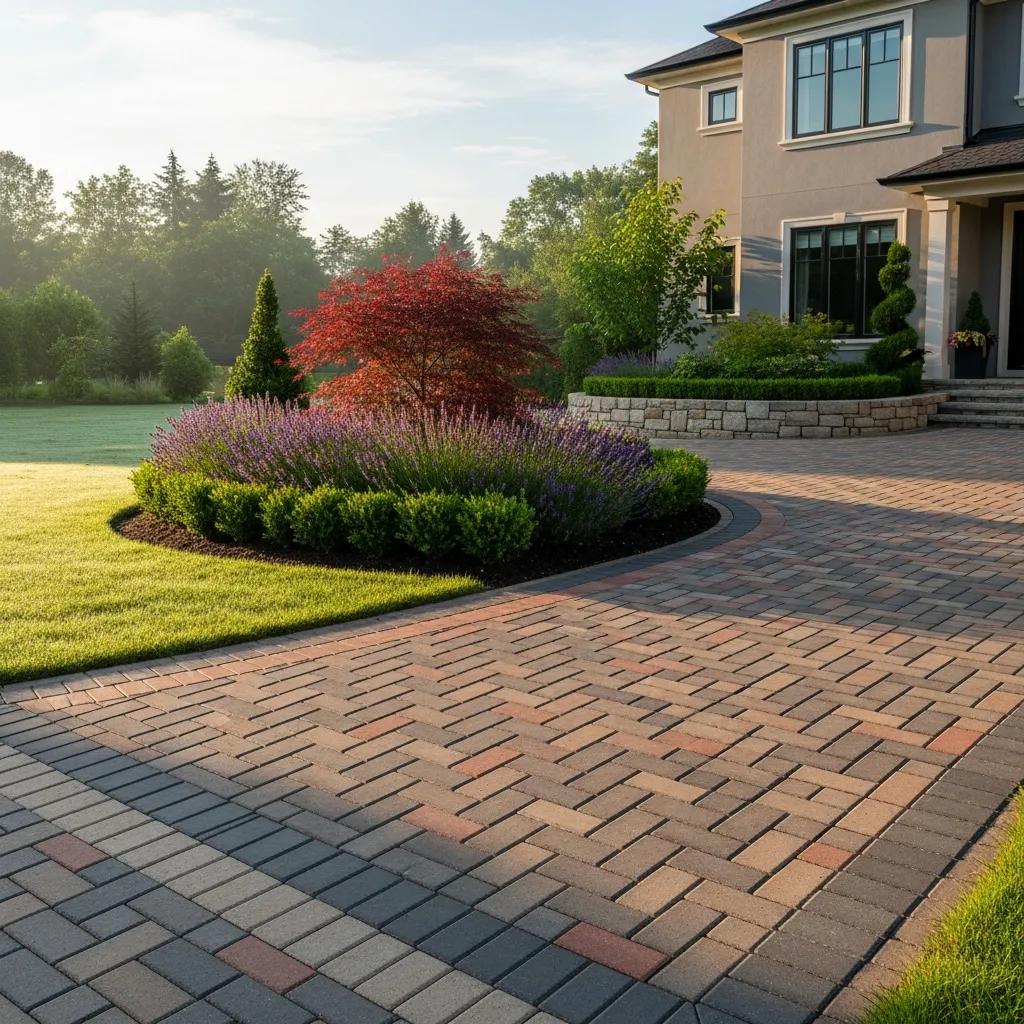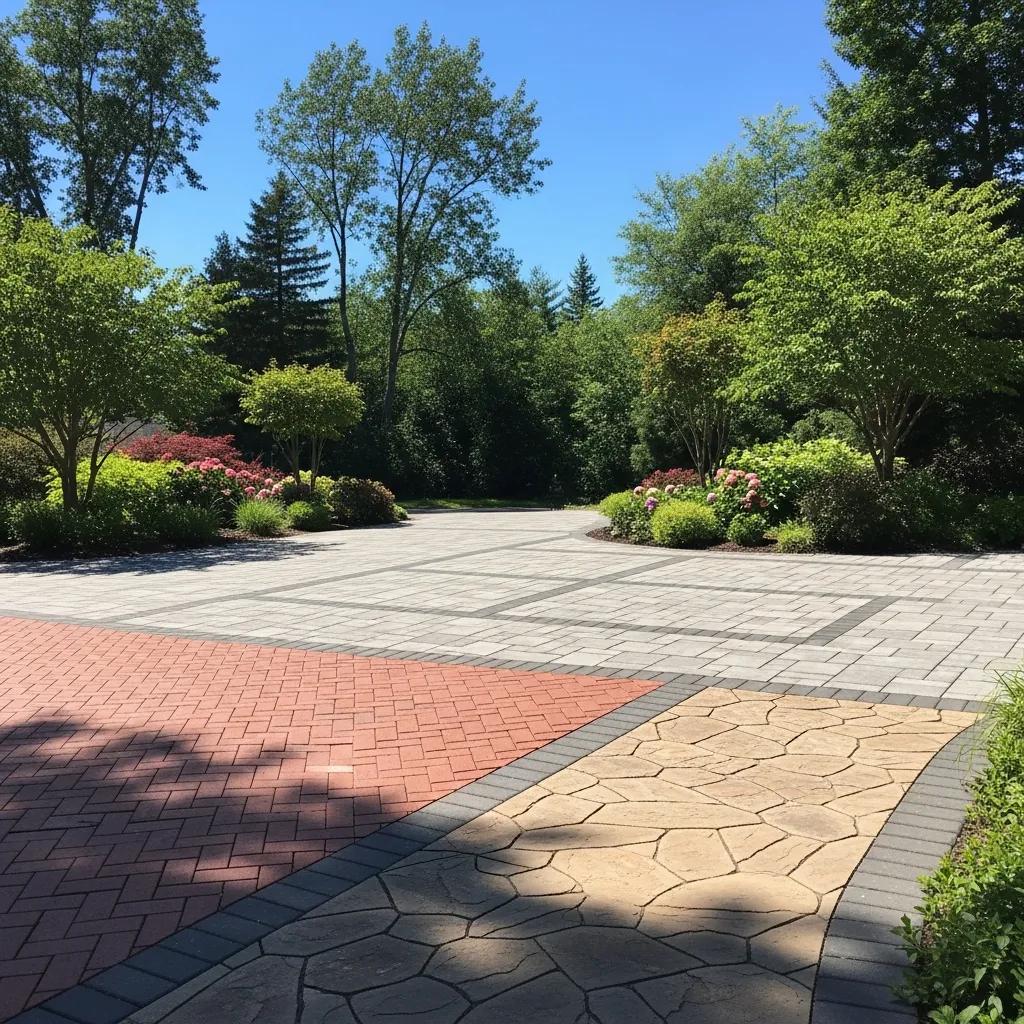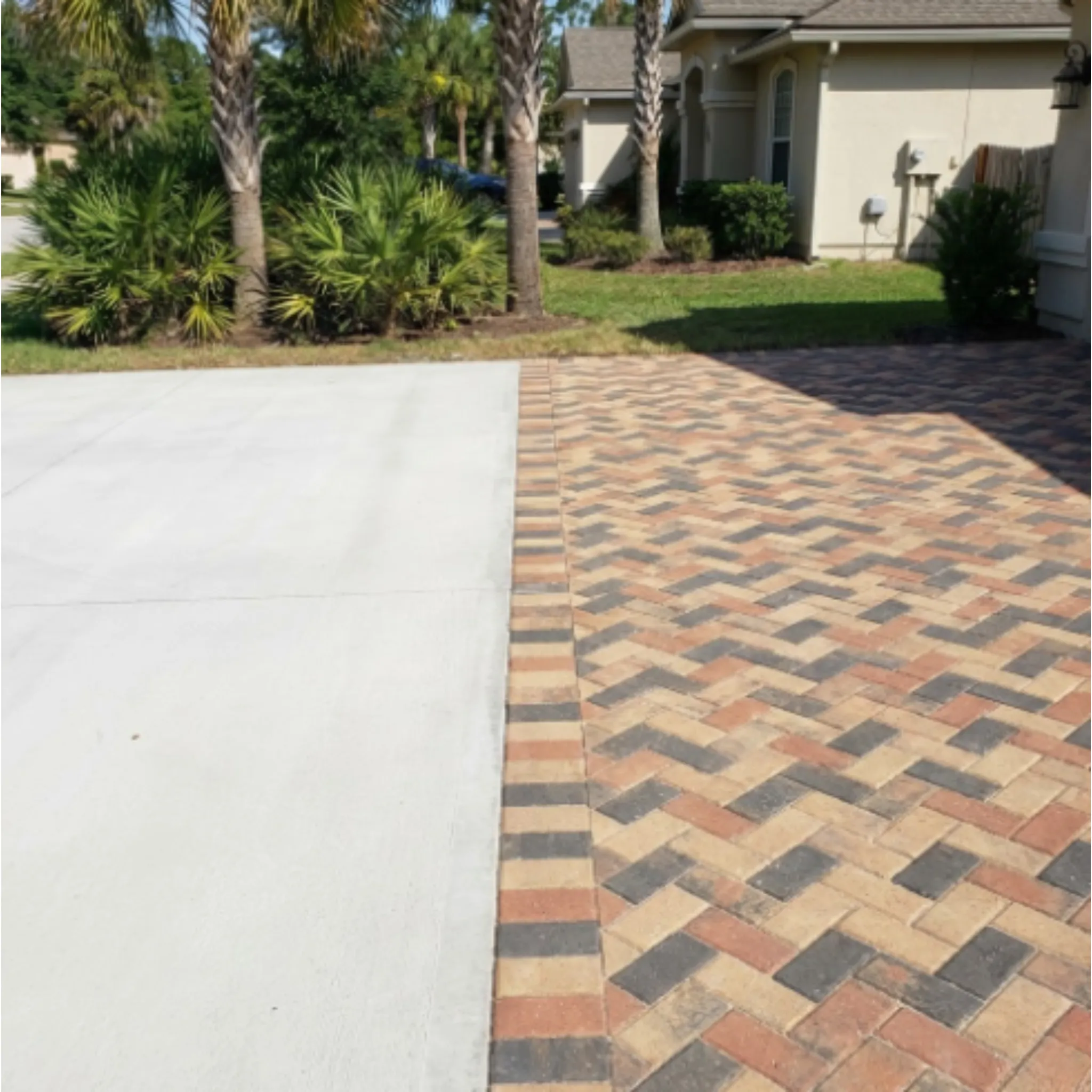When considering upgrading your home’s curb appeal, the choice of a Jacksonville paver driveway is pivotal. Traditional and modern pavers offer distinct styles and benefits that can transform the look and functionality of your driveway.
This article discusses the key differences between traditional and modern pavers, helping you decide which is the better option for your outdoor spaces in Jacksonville. Keep reading to discover which paver style meets your aesthetic and functional needs.
Continue reading as we explore these paving options further. Learn how to make your driveway not only stand out but also add value to your property.
The Basics of Paver Driveways
Paver driveways, a popular choice for many homeowners in Jacksonville, offer a distinctive blend of aesthetics and functionality. These driveways are constructed from individual paving stones, which are available in a wide variety of shapes, colors, and textures. This variety allows for customized designs that can complement any home’s outdoor living space and enhance curb appeal.
- 4x Stronger than Traditional Driveways: One of the key advantages of paver driveways is their durability. Unlike traditional concrete or asphalt surfaces, paver driveways are less likely to crack. This is due to the interlocking design of the pavers, which provides flexibility under heavy vehicle loads and weather changes. Additionally, if a section of the driveway does become damaged, only the affected pavers need to be replaced. Thus, providing more savings and time, rather than redoing the entire surface.
- Better Drainage: Paver driveways also boast more proper drainage than their counterparts. The gaps between the pavers allow water to percolate through the surface. This reduces runoff and decreases the burden on local drainage systems. This permeability can also prevent the pooling of water, which helps maintain the integrity of the driveway over time.
- Ease of Maintenance: Maintenance of paver driveways is relatively straightforward. Regular sweeping and occasional rinsing with a hose is usually sufficient to keep the driveway looking its best. For more stubborn stains, a pressure washer or a simple solution of water and detergent can be used.
Given their functional benefits, it’s no surprise that paver driveways are an excellent choice in Jacksonville. Homeowners looking to enhance their property value and curb appeal often turn to this reliable and attractive option.
Traditional vs. Modern Paver Driveways
What Defines Traditional Paver Driveways?
Traditional paver driveways include a variety of materials like asphalt, concrete, and gravel. Each material offers distinct benefits suitable for different environments and homeowner preferences.
- Asphalt is the chosen material for driveways, particularly in northern U.S. climates with freeze-thaw cycles. It also absorbs heat, aiding in melting snow more quickly, but it requires regular maintenance, such as sealing every three to five years.
- Concrete is versatile and durable, making it a popular choice across various weather conditions. It’s low-maintenance and can be customized with an array of colors and textures. However, it can be more expensive upfront compared to gravel or asphalt.
- Gravel is another traditional option, favored for its quick installation and lower initial cost. It offers a wide range of colors for customization. However, it requires significant maintenance, especially in areas prone to snow. It can be less practical due to the challenges in snow removal.
Each of these materials offers unique advantages and considerations, from aesthetic appeal to environmental impact and maintenance needs. Choosing the right material will depend on the specific needs, budget, and climate.
Advantages of Modern Driveway Materials
Modern driveways have transcended beyond traditional asphalt and concrete options. They provide a range of innovative materials that offer durability, aesthetic appeal, and environmental benefits.
Permeable Pavers
Permeable pavers are a revolutionary choice for driveway materials. Constructed from concrete or natural stone, these pavers have gaps between them. These gaps allow water to filter through and be absorbed by the ground beneath. This feature reduces runoff, which can carry pollutants into water systems, and helps replenish groundwater levels.
Additionally, permeable pavers can reduce the “heat island” effect commonly associated with traditional paving materials, making them an environmentally friendly option.
Resin-Bound Paving
Resin-bound paving is another popular choice for modern driveways. This material combines aggregate stones and resin to create a smooth, durable surface that is highly resistant to weeds and does not displace loose stones. The finish is not only attractive and customizable in various colors but also provides a non-slip surface.
Resin-bound driveways require minimal maintenance and are quick to install, making them a cost-effective solution over time.
Recycled Materials
Recycled materials are also used in innovative driveway constructions. Examples of recycled materials used in paving driveways are rubber from used tires or crushed glass. These materials are not only environmentally sustainable. It also provides unique visual appeal and excellent durability. Rubber driveways offer enhanced safety due to their shock-absorptive properties. They are also less likely to crack under temperature changes.
Each of these materials provides distinct advantages that cater to different needs. Homeowners can choose based on their specific priorities.
Which Driveway Style Suits Jacksonville Homes?
When selecting the ideal driveway style for Jacksonville outdoor spaces, consider how each option complements the architectural diversity found across the city. From beachside homes to historical residences, each material contributes to both functionality and curb appeal.
Concrete Driveways
Concrete driveways offer durability and a range of customization options. While they serve well, especially for modern homes, they lack the elegance that beautiful paver driveways can provide to enhance a home’s character.
Asphalt Driveways
Known for their straightforward installation, asphalt driveways are practical for many suburban settings. They fit well with ranch-style and mid-century modern homes. However, they do not offer the same level of customization and finish that paver driveways bring.
Paver Driveways
Paver driveways stand out as the premier choice for Jacksonville homeowners. They are customizable and available in various materials, such as:
They are suited to complement Mediterranean or Spanish-style homes, harmonizing with Jacksonville’s tropical landscaping. The ability to integrate colors and textures that resonate with local natural scenery makes premium pavers a wise investment that enhances curb appeal and property value.
Gravel Driveways
While gravel driveways can suit the rustic charm of cottage-style homes, they lack the refinement and durability offered by paver options. Gravel can shift and require regular maintenance, which might not appeal to homeowners looking for a low-maintenance driveway solution.
Stamped and Colored Concrete
This option attempts to mimic the appearance of more expensive materials like those used in artistic paver driveways. While offering modern aesthetic flexibility, stamped and colored concrete still falls short of providing the authentic richness and feel that genuine materials in paver driveways deliver.
While there are several viable driveway materials for Jacksonville outdoor living spaces, paver driveways hold a distinct advantage. Their versatility, durability, and aesthetic appeal make them an optimal choice for homeowners. This is especially true for homeowners looking to complement their home’s architectural style while investing in their property’s value.
Suggested Reading: Paver Driveway Cost vs Concrete: What You Need to Know Before Making Your Choice
Considerations for Longevity and ROI
When homeowners in Jacksonville evaluate different driveway materials, considerations of longevity and potential return on investment (ROI) are crucial. Each driveway material offers distinct long-term benefits and impacts property value differently.
- Concrete Driveways: This type of driveway material lasts between 30- 40 years with proper maintenance. Concrete’s initial cost might be higher than asphalt, but its longevity and low maintenance requirements often lead to a better ROI. Concrete driveways can also be customized with colors and patterns, increasing a home’s curb appeal and market value.
- Asphalt Driveways: They have a shorter lifespan, lasting about 20 years with regular sealing and patching. While the initial investment is lower, frequent maintenance can add up. This diminishes its ROI compared to more durable materials like concrete or pavers.
- Paver Driveways: Pavers are highly regarded for both their aesthetic appeal and resilience. A well-installed paver driveway can last more than 40 years. The initial cost for pavers is higher. However, this type of material offers excellent ROI due to its longevity and the significant boost to property aesthetics and value. If a section of the driveway becomes damaged, individual pavers can be replaced without having to redo the entire driveway. This makes maintenance more manageable and cost-effective over time.
- Gravel Driveways: Gravel is the least expensive option upfront and can last indefinitely. Maintenance involves topping up the gravel and regrading the driveway as needed. However, gravel does not significantly increase property value compared to other materials. Its ongoing maintenance requirements and lesser aesthetic impact can make it a less attractive option in terms of ROI.
- Stamped and Colored Concrete: This driveway type can last as long as traditional concrete driveways, around 30 to 40 years. However, they may require more frequent surface treatments to maintain their appearance. The need for specialized maintenance can affect its cost-effectiveness.
Final Thoughts
When considering the perfect driveway for a Jacksonville home, homeowners face a choice between traditional and modern paver driveways. Ultimately, the perfect pavers for each homeowner should be guided by their specific needs, preferences, and the architectural style of their home. Consider how each option will integrate with the property’s existing aesthetics and functionality.
For those ready to build their driveway, consulting with a skilled team can provide valuable insights and guidance. Coastal Driveway Pavers offers professional service in paver driveways and can help tailor a solution that matches your requirements.
To explore the possibilities for your home, contact Coastal Driveway Pavers today to schedule a free consultation and accurate estimates. Start transforming the entrance to your home into a stylish statement.
Frequently Asked Questions
For smaller areas, herringbone patterns are excellent because they provide great interlock and aesthetic interest. For larger spaces, a running bond or basketweave pattern can enhance the perception of space while also providing stability. The best paver pattern often depends on the visual effect you wish to achieve and the functional needs of the space.
Concrete pavers are highly versatile and come in a variety of colors and shapes, making them suitable for almost any driveway project. Natural stone pavers, while more expensive, offer a unique, upscale look, with each piece being distinct.
Natural stone pavers tend to last the longest due to their durability and resistance to weather conditions. Among stone options, granite and bluestone are particularly resilient. Concrete pavers are also durable but may fade or wear over time depending on the quality of the material and paver driveway installation.
Natural stone pavers, such as those made from granite, marble, or limestone, are typically the most expensive. These materials are prized for their natural beauty and longevity but come at a higher price point due to the quarrying and cutting processes involved.
Interlocking concrete paver blocks are widely regarded as the best option for most paving needs due to their versatility and strength. They fit together snugly, creating a strong surface that can handle vehicles and high-traffic areas well. Additionally, they are available in various textures and colors, allowing for custom design solutions.

Written By:
